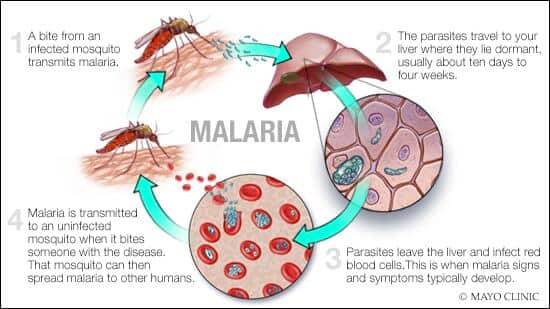Malaria, a mosquito-borne infectious disease, remains a significant global health concern. It is caused by the Plasmodium parasite, which infects humans through the bite of infected female Anopheles mosquitoes. With diverse species and strains of Plasmodium, malaria presents itself in a variety of ways. Understanding its symptoms is vital for timely diagnosis and treatment.
Common Symptoms
Malaria typically manifests with flu-like symptoms, which can vary in severity. The most common signs include:
1. Fever:Recurrent high fevers are a hallmark of malaria. These fevers often come in cycles, corresponding to the parasite's life cycle in the bloodstream.
2. Chills and Sweats:Malaria-infected individuals often experience chills and shivering, followed by profuse sweating as the fever subsides.
3. Headache:Intense headaches are common and can be debilitating.
4. Fatigue:Malaria can cause severe fatigue, making it challenging to carry out daily activities.
5. Muscle and Joint Pain:Aches and pains in muscles and joints are often reported.
6. Nausea and Vomiting: Gastrointestinal symptoms like nausea and vomiting may occur.
7. Anemia:Prolonged malaria infection can lead to anemia due to the destruction of red blood cells.
Severe Symptoms:
In some cases, malaria can progress to severe or complicated forms, which can be life-threatening. These symptoms include:
1. Severe Anemia:A significant loss of red blood cells can lead to severe anemia, causing weakness and shortness of breath.
2. Cerebral Malaria: In rare cases, the parasite can infect the brain, leading to seizures, confusion, and coma.
3. Respiratory Distress: Severe malaria can cause acute respiratory distress syndrome, making breathing difficult.
4. Organ Failure: Malaria can lead to organ failure, particularly affecting the liver and kidneys.
Malaria is endemic in many tropical and subtropical regions, primarily in sub-Saharan Africa. Preventive measures, such as insecticide-treated bed nets and antimalarial medications, play a crucial role in reducing the risk of infection. Early diagnosis through blood tests is essential for effective treatment.
Prompt treatment with antimalarial drugs like artemisinin-based combination therapies (ACTs) is the key to recovery. Delayed treatment can lead to complications and, in severe cases, prove fatal.
Malaria is a stealthy killer with a wide range of symptoms, making it challenging to diagnose solely based on clinical presentation. Awareness, prevention, and early treatment are pivotal in the fight against this deadly disease. Collaborative efforts worldwide continue to combat malaria, with the hope of one day eliminating it entirely.




No comments yet
Be the first to share your thoughts!